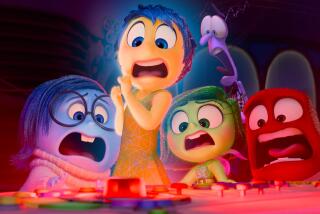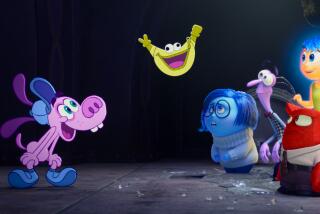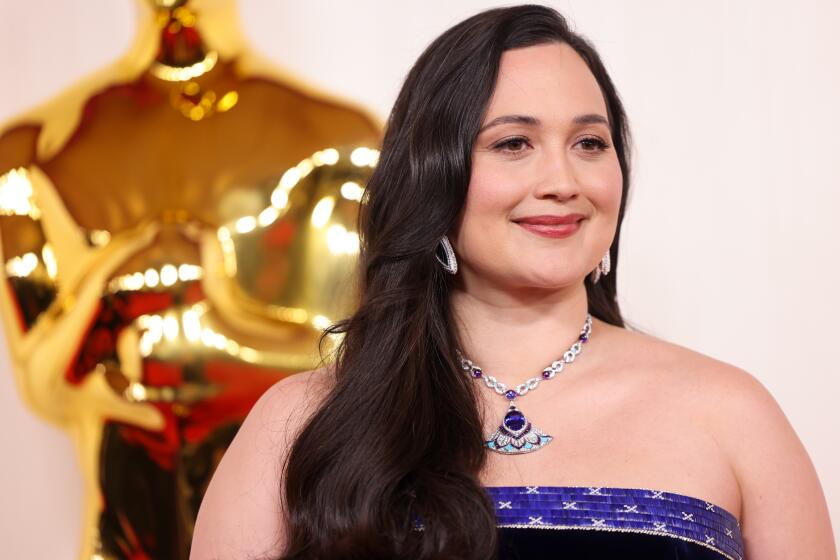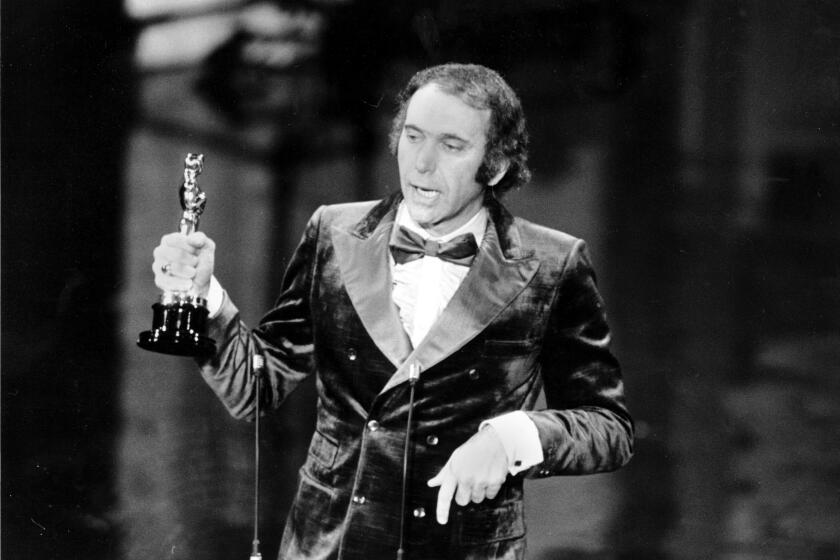Calendar Goes To the OSCARS : Analysis: It’s a Long Road for ‘Miss Daisy’ : But don’t be surprised if Jessica Tandy, Morgan Freeman and the film are all winners on Monday night
In 1986, when Steven Spielberg was overlooked for a best director nomination while his film, “The Color Purple,” was totaling 11 nominations elsewhere, the media reacted as if they had witnessed the biggest scandal since Fatty Arbuckle threw a party in San Francisco.
Columnists whined that the directors’ branch of the academy had snubbed Spielberg because its members envied his success. The Hollywood Reporter’s Martin Grove, as genial a booster as the industry has had, demanded an in-house investigation. Critics pointed out that some voting directors were old enough to have made silent films, laying the snub off on the decay of years. And after “The Color Purple” failed to receive a single award, Quincy Jones, who had been nominated for the film’s score, bluntly accused the academy of racism.
The question all this raises four years later is, where was the outrage when the directors failed to nominate Bruce Beresford last month for “Driving Miss Daisy,” a film that led all others this year in total nominations and came within two of matching “The Color’s Purple’s” 11? Where were the charges of scandal, the ageist insults, the calls for mandatory drug-testing in the directors’ branch?
There are several things that may explain why Beresford’s snub failed to raise hackles. He is, first of all, not an industry insider. He’s an Australian whose best movies (“Breaker Morant,” “Tender Mercies”) barely registered a pulse on the box-office charts. Certainly, no one could accuse the directors’ branch of turning its nose up at his commercial success and vast fortunes. Also, Beresford had failed to land a nomination from the Directors Guild of America, the national organization whose voting often presages the Oscars. (In 1986, the DGA thumbed its nose at the academy by giving its top award to Spielberg.)
Finally, “Driving Miss Daisy” has neither polarized opinion nor drawn attention to its director the way “The Color Purple” did. It is a calm, slowly paced film that is minus the emotional fireworks and frenetic payoff scenes orchestrated for “The Color Purple.” On paper, these two films have a lot in common: both are adapted from works by Southern writers looking at Southern racial issues and both were directed by white outsiders. On the screen, they were worlds apart--one stylistically aggressive, the other subdued. Just so were the reactions to the snubbing of their directors.
We will never know how “The Color Purple” would have done had Spielberg been nominated. Sydney Pollack’s “Out of Africa,” which was going neck-and-neck with “The Color Purple” at the box office, swept the boards that year. But Monday night, don’t be surprised if “Driving Miss Daisy” succeeds where “The Color Purple” failed, by being named best picture even though its director was not nominated.
“Driving Miss Daisy” rode into the voting period on a box-office and critical high. The film’s stars, Morgan Freeman and Jessica Tandy, were being extolled for their gentle performances and Alfred Uhry’s adaptation of his own play was prompting thoughtful, sympathetic essays on its perceptions of the South. People seem to either love it or are unmoved by it; there has been no controversy and none of the debate prompted by “The Color Purple.”
Meanwhile, its chief rival--Oliver Stone’s “Born on the Fourth of July”--had just about played itself out in theaters and, as the final ballots were distributed, it was being buffeted by criticism of Stone’s and co-screenwriter Ron Kovic’s loose interpretation of Kovic’s own story. “Born on the Fourth of July,” once the heavy favorite in several categories, has gotten less certain each day. Similar attacks seemed to have buried the Oscar chances of documentary film maker Michael Moore’s “Roger & Me.”
Still, for “Driving Miss Daisy” to win as best picture, it would have to overcome some strong voting patterns. Every year since 1982, and for the decade before that, the voters linked the best picture with both best director and best screenplay. If “Driving Miss Daisy” wins, it will be the first time since “Grand Hotel” in 1932 that the best picture Oscar went to a movie whose director wasn’t even nominated.
If that has happened this year, we’ll get our first clue when the Academy Award for best adapted screenplay is presented. Uhry and Stone and Kovic are head to head in that category. Uhry has already won the adapted screenplay award from the Writers Guild of America.
The guess here, with a buck in the office pool, is that “Driving Miss Daisy” will win both best adapted screenplay and best picture.
The other three best-picture nominees are almost equal long shots. Peter Weir’s “Dead Poets Society” was a commercial hit and both Weir and Tom Schulman’s original screenplay were nominated. But it is a summer movie competing with films in current release.
“My Left Foot” was also included in the director and screenplay categories, but it’s an independent film not widely seen, and not likely to be; the academy rarely gives small pictures its biggest prize.
“Field of Dreams” was released even earlier in the year than “Dead Poets Society” and though Phil Alden Robinson’s screenplay was nominated, he was omitted from the directors’ ballot.
If only directors were voting on the final ballot, Kenneth Branagh might win for “Henry V.” Directors were understandably dazzled by Branagh’s rookie effort, as actors were in Branagh’s nominated performance in the title role, but how many of the academy’s 4,800 voters do you think actually saw the movie? Come on, how many?
Whether his movie wins or not, Oliver Stone figures to take home the director’s Oscar. Branagh and Sheridan overcame the odds just in being nominated, Woody Allen’s “Crimes and Misdemeanors” provoked mixed reactions and wasn’t nominated for best picture, and both Allen and Weir were runner-ups to Stone in the DGA voting.
If the best picture is hard to pick, the best actor is impossible. Tom Cruise would almost surely be included in a “Born on the Fourth of July” sweep, and if actors alone were voting, the winner would likely be Daniel Day-Lewis for “My Left Foot.” His performance as disabled Irish painter and writer Christy Brown is not one that many other actors would look at and think to themselves, “I could do that.”
In what is one of the strongest actor ballots in years, Morgan Freeman may have a slight edge. His work as the chauffeur Hoak in “Driving Miss Daisy” was one of four excellent performances he gave during the year (he starred in “Lean on Me,” and had strong supporting roles in “Glory” and “Johnny Handsome”). The academy has a tendency to reward actors for the recent body of their work; on that score, Freeman is ahead on points.
Robin Williams gave a performance everyone liked in “Dead Poets Society,” but it could have just as easily been considered a supporting performance and he and Kenneth Branagh (“Henry V”) are the longest shots in a classy field.
Jessica Tandy, a strong entry in the weak best-actress category, is the surest bet among all nominees. Isabelle Adjani may have had a tougher role, playing a brilliant artist who goes mad in the shadow of her lover, the sculptor Rodin, but “Camille Claudel” is a foreign language film. Not since Sophia Loren was named best actress for “Two Women” in 1961 has a non-English speaking performance won an Oscar.
Michelle Pfeiffer, who finally became a bankable star in “The Fabulous Baker Boys,” probably represents Tandy’s strongest competition. Pauline Collins, who reprieved her stage role in “Shirley Valentine,” and Jessica Lange, playing an attorney defending her father against Nazi war crimes charges, seem prohibitive long shots.
Conventional wisdom has it that Lena Olin and Anjelica Huston, two of Ron Silver’s three wives in “Enemies, A Love Story,” will cancel each other out in the voting and give Brenda Fricker, Christy Brown’s indomitable mom in “My Left Foot,” a clear path to the Oscar. Others think that Huston, like Morgan Freeman, will carry the day because she has done so much other good work lately, pointing specifically to her role as the mistress-cum-murder-victim in “Crimes and Misdemeanors.” The pick here, however, is Fricker.
Vastly tougher to figure is the supporting-actor race. Danny Aiello, who played the racist Italian-American pizza parlor owner in Spike Lee’s “Do the Right Thing,” was the critics’ favorite, but for whatever reasons, the academy didn’t take to the movie. If voters were conscious of racial issues when they voted, they may have been more inclined to vote for Denzel Washington, an emerging star who played an angry runaway slave in a black Union regiment in “Glory.”
The only nominee who seems out of the running is Marlon Brando (“A Dry White Season”), whose residual appeal to the actors’ branch is not likely to carry him through the general vote. Martin Landau was a strong nominee in the category last year for “Tucker,” and had an even more demanding role as a philandering eye doctor in “Crimes and Misdemeanors.” The two performances could be worth one Oscar in the minds of voters.
Dan Aykroyd, who surprised his critics with a solid turn as Tandy’s doting son in “Driving Miss Daisy,” is a long shot, but could be carried along by a general swoon for the movie.
The choice here to win as best supporting actor is Denzel Washington.
More to Read
Only good movies
Get the Indie Focus newsletter, Mark Olsen's weekly guide to the world of cinema.
You may occasionally receive promotional content from the Los Angeles Times.






